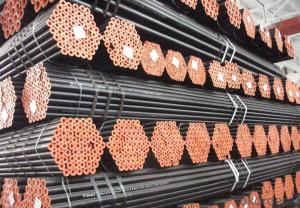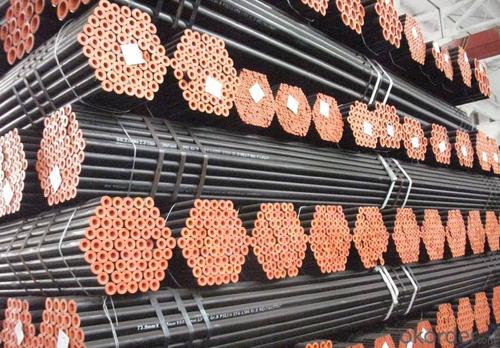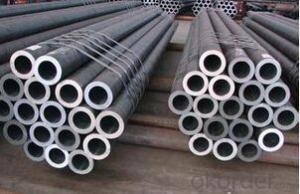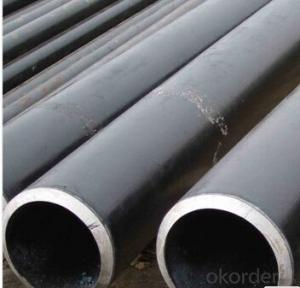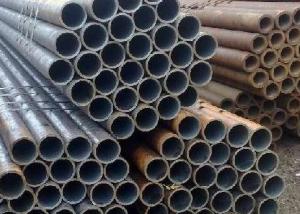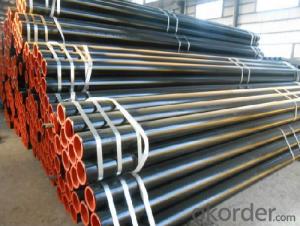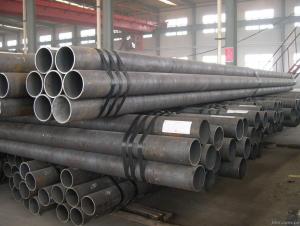Seamless steel tube for medium and low pressure boiler
- Loading Port:
- Tianjin
- Payment Terms:
- TT or LC
- Min Order Qty:
- 45 m.t.
- Supply Capability:
- 17000 m.t./month
OKorder Service Pledge
OKorder Financial Service
You Might Also Like
1、Structure of Seamless steel tube for medium and low pressure boiler:
Seamless pipe is formed by drawing a solid billet over a piercing rod to create the hollow shell. As the manufacturing process does not include any welding, seamless pipes are perceived to be stronger and more reliable. Historically seamless pipe was regarded as withstanding pressure better than other types,
2、Main Features of Seamless steel tube for medium and low pressure boiler:
• High manufacturing accuracy
• High strength
• Good visual effect
• Reasonable price
3、Seamless steel tube for medium and low pressure boiler Specification:
Standard | GB, DIN, ASTM ASTM A106-2006, ASTM A53-2007 |
Grade | 10#-45#, 16Mn 10#, 20#, 45#, 16Mn |
Thickness | 8 - 33 mm |
Section Shape | Round |
Outer Diameter | 133 - 219 mm |
Place of Origin | Shandong, China (Mainland) |
Secondary Or Not | Non-secondary |
Application | Hydraulic Pipe |
Technique | Cold Drawn |
Certification | API |
Surface Treatment | factory state or painted black |
Special Pipe | API Pipe |
Alloy Or Not | Non-alloy |
Length | 5-12M |
Outer Diameter | 21.3-610mm |
Grade | 20#, 45#, Q345, API J55, API K55, API L80, API N80, API P110, A53B |
Standard | ASME, ASTM |
1) Material:20#(ASTM A 106/A53 GRB.API5LGRB,GB),45#,16Mn,10#.
2) Specification range:OD:21.3-610mm,WT:6-70mm,length:6-12m or according to the requirement of clients.
3) Excutive standards:GB,ASME API5L.ASTM A 106/A53,Despite of the above standards,we can also supply seamless steel pipe with standard of DIN,JIS,and so on,and also develop new products according to the requirements of our clients!
4) Surface:black lacquered,varnish coating or galvanized.
5) Ends:Beveled or square cut,plastic capped,painted.
6) Packing:bundles wrapped with strong steel strip,seaworthy packing.
4、Packaging & Delivery
Packaging Details: | seaworthy package,bundles wrapped with strong steel strip |
Delivery Detail: | 15-30days after received 30%TT |
5、FAQ of Seamless steel tube for medium and low pressure boiler:
①How is the quality of your products?
Our products are manufactured strictly according to national and internaional standard, and we take a test
on every pipe before delivered out. If you want see our quality certifications and all kinds of testing report, please just ask us for it.
Guaranteed: If products’ quality don’t accord to discription as we give or the promise before you place order, we promise 100% refund.
②Why should you chose us?
Chose happens because of quality, then price, We can give you both.Additionally, we can also offer professional products inquiry, products knowledge train(for agents), smooth goods delivery, exellent customer solution proposals.Our service formula: good quality+good price+good service=customer’s trust
SGS test is available, customer inspection before shipping is welcome, third party inspection is no problem.
6、Seamless steel tube for medium and low pressure boiler Images:
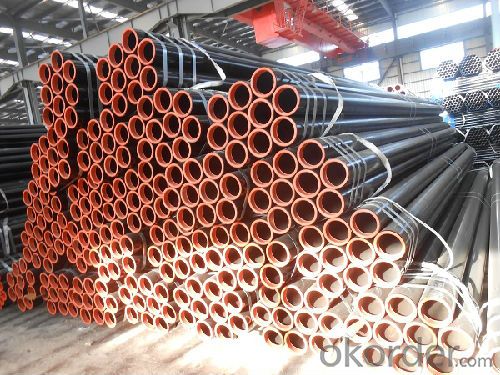
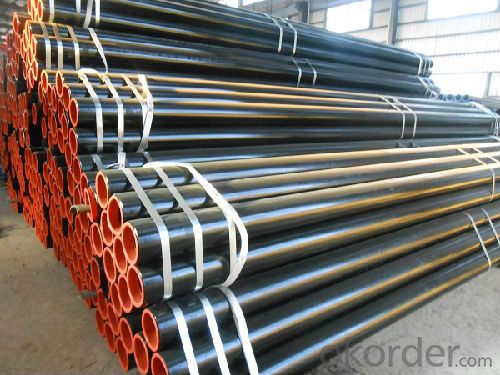
- Q: What are the different types of steel pipe fittings for industrial applications?
- There are several different types of steel pipe fittings commonly used in industrial applications. These include elbows, tees, couplings, unions, reducers, flanges, and caps. Each of these fittings serves a specific purpose in connecting and directing the flow of fluids or gases within a piping system.
- Q: What is the impact toughness of steel pipes?
- The ability of steel pipes to withstand sudden or high-velocity impacts without fracturing or breaking is referred to as their impact toughness. This property measures the material's resistance to cracking when subjected to dynamic loading conditions. The impact toughness of steel pipes is highly significant as it determines their capacity to endure accidental impacts or external forces during transportation, installation, and operation. To evaluate the impact toughness of steel pipes, standardized tests such as the Charpy V-notch test or the Izod test are commonly utilized. These tests involve striking a notched sample of the steel pipe with a pendulum or a falling weight and measuring the amount of energy absorbed by the material until it fractures. The impact toughness is then calculated based on this energy absorption. A high impact toughness is desirable in steel pipes as it signifies a greater ability to absorb energy and resist fracture, making them more resilient to sudden impacts or loading conditions. This characteristic is particularly crucial in applications where steel pipes are exposed to high-stress environments, such as in oil and gas pipelines, automotive components, or structural applications. Several factors can influence the impact toughness of steel pipes, including their chemical composition, heat treatment, and microstructure. For instance, alloying elements like manganese, chromium, and nickel can enhance the impact toughness by promoting the formation of fine-grained microstructures and preventing crack propagation. Similarly, appropriate heat treatment processes like quenching and tempering can optimize the material's microstructure and mechanical properties, thereby improving its impact toughness. In conclusion, the impact toughness of steel pipes is a vital property that determines their ability to withstand sudden or high-velocity impacts. It is evaluated through standardized tests and can be influenced by factors such as chemical composition, heat treatment, and microstructure. A high impact toughness is desirable in steel pipes to ensure their structural integrity and resistance to fracture when subjected to dynamic loading conditions.
- Q: Can steel pipes be used for oil drilling operations?
- Yes, steel pipes are commonly used for oil drilling operations due to their strength, durability, and resistance to high pressure and extreme temperatures.
- Q: What are the quality control measures for steel pipe production?
- Quality control measures for steel pipe production typically include the inspection of raw materials, monitoring of manufacturing processes, and testing of finished products. These measures ensure that the steel pipes meet the required specifications and standards. Additionally, quality control may involve conducting visual inspections, dimensional checks, non-destructive testing, and mechanical testing to ensure the strength, durability, and overall quality of the pipes.
- Q: Can steel pipes be used for conveying compressed air?
- Indeed, compressed air can indeed be conveyed through steel pipes. In industrial settings, steel pipes find frequent use due to their ability to withstand high pressure and maintain durability. With their remarkable tensile strength, steel pipes prove capable of handling the immense pressures generated by compressed air systems. Furthermore, the resistance of steel pipes to corrosion becomes crucial when confronted with moisture within compressed air. Nevertheless, it remains vital to guarantee that the steel pipes are adequately sized and rated to meet the precise pressure and flow prerequisites of the compressed air system. Moreover, adhering to proper installation and maintenance practices becomes imperative to avert any potential leaks or failures.
- Q: What is the purpose of pipe flanges in steel pipes?
- The purpose of pipe flanges in steel pipes is to provide a secure and leak-proof connection between two pipes or to other equipment, such as valves or pumps. Flanges allow for easy assembly and disassembly of pipe sections, as well as providing a means for maintenance and repairs. Additionally, they provide a stronger connection, ensuring the integrity and stability of the pipeline system.
- Q: Can steel pipes be used for fencing or railing?
- Yes, steel pipes can definitely be used for fencing or railing purposes. Steel pipes are known for their durability, strength, and resistance to corrosion, making them a popular choice for construction projects like fencing and railings. They provide a sturdy and long-lasting solution for securing properties or creating barriers, while also offering an aesthetically pleasing and modern look.
- Q: How are steel pipes used in the manufacturing of food and beverage processing plants?
- Steel pipes are commonly used in the manufacturing of food and beverage processing plants due to their durability, cleanliness, and resistance to corrosion. These pipes are utilized for various purposes such as transporting liquids, gases, and ingredients within the plant. They are also essential for the distribution of water, steam, and other fluids required in the production and cleaning processes. Additionally, steel pipes are used for the installation of equipment, such as pumps and valves, ensuring a safe and efficient operation of the plant.
- Q: How are steel pipes used in the construction of wind farms?
- Steel pipes are used in the construction of wind farms for various purposes, such as supporting wind turbine towers, providing a strong foundation for the turbines, and transmitting electricity generated by the turbines to the power grid.
- Q: How do you calculate the pipe thermal expansion coefficient for steel pipes?
- The pipe thermal expansion coefficient for steel pipes can be calculated using the formula: α = (L2 - L1) / (L1 * (T2 - T1)) Where: α is the pipe thermal expansion coefficient L1 is the initial length of the pipe L2 is the final length of the pipe T1 is the initial temperature of the pipe T2 is the final temperature of the pipe. This formula takes into account the change in length and the change in temperature to determine the coefficient of thermal expansion for steel pipes.
Send your message to us
Seamless steel tube for medium and low pressure boiler
- Loading Port:
- Tianjin
- Payment Terms:
- TT or LC
- Min Order Qty:
- 45 m.t.
- Supply Capability:
- 17000 m.t./month
OKorder Service Pledge
OKorder Financial Service
Similar products
Hot products
Hot Searches
Related keywords
